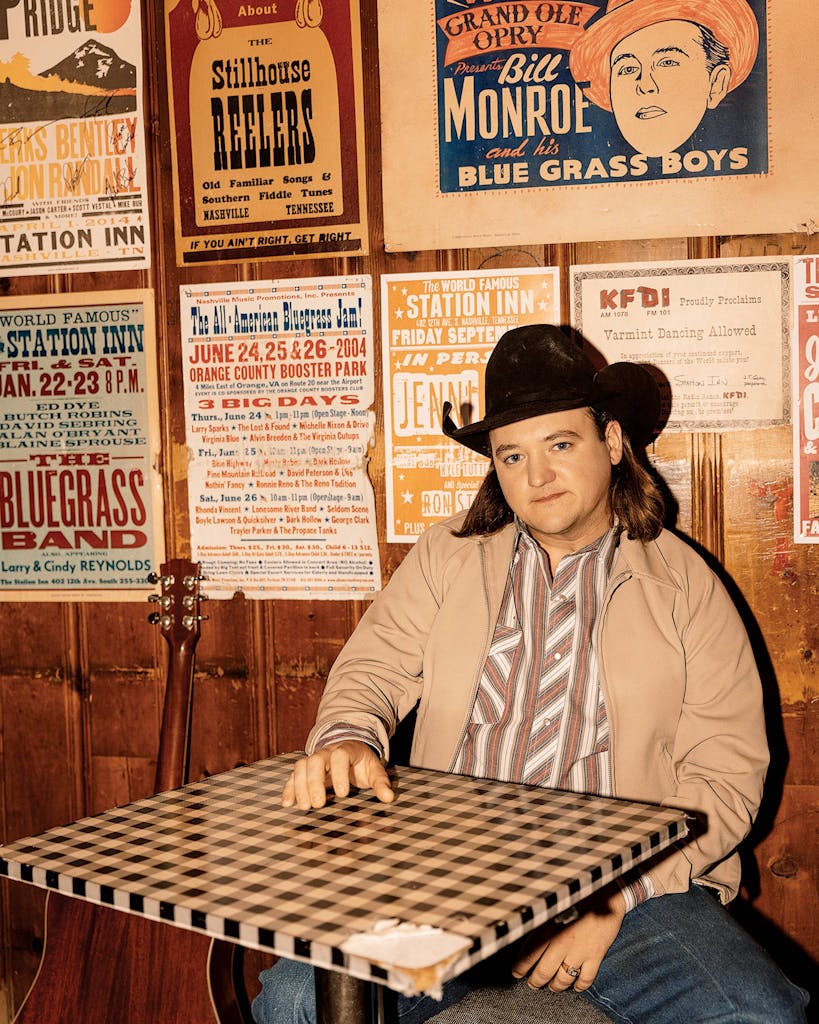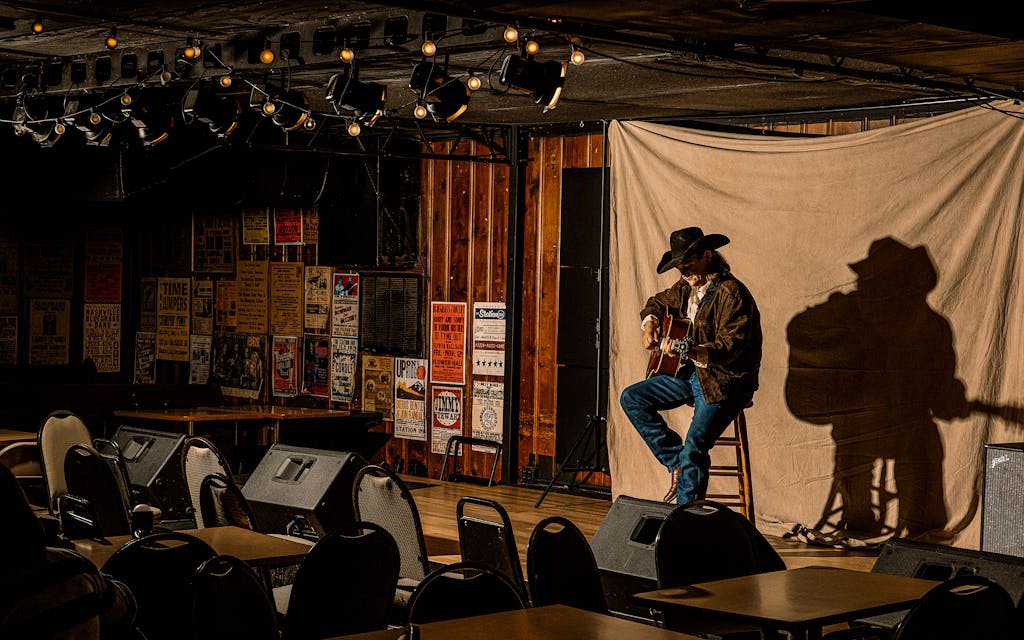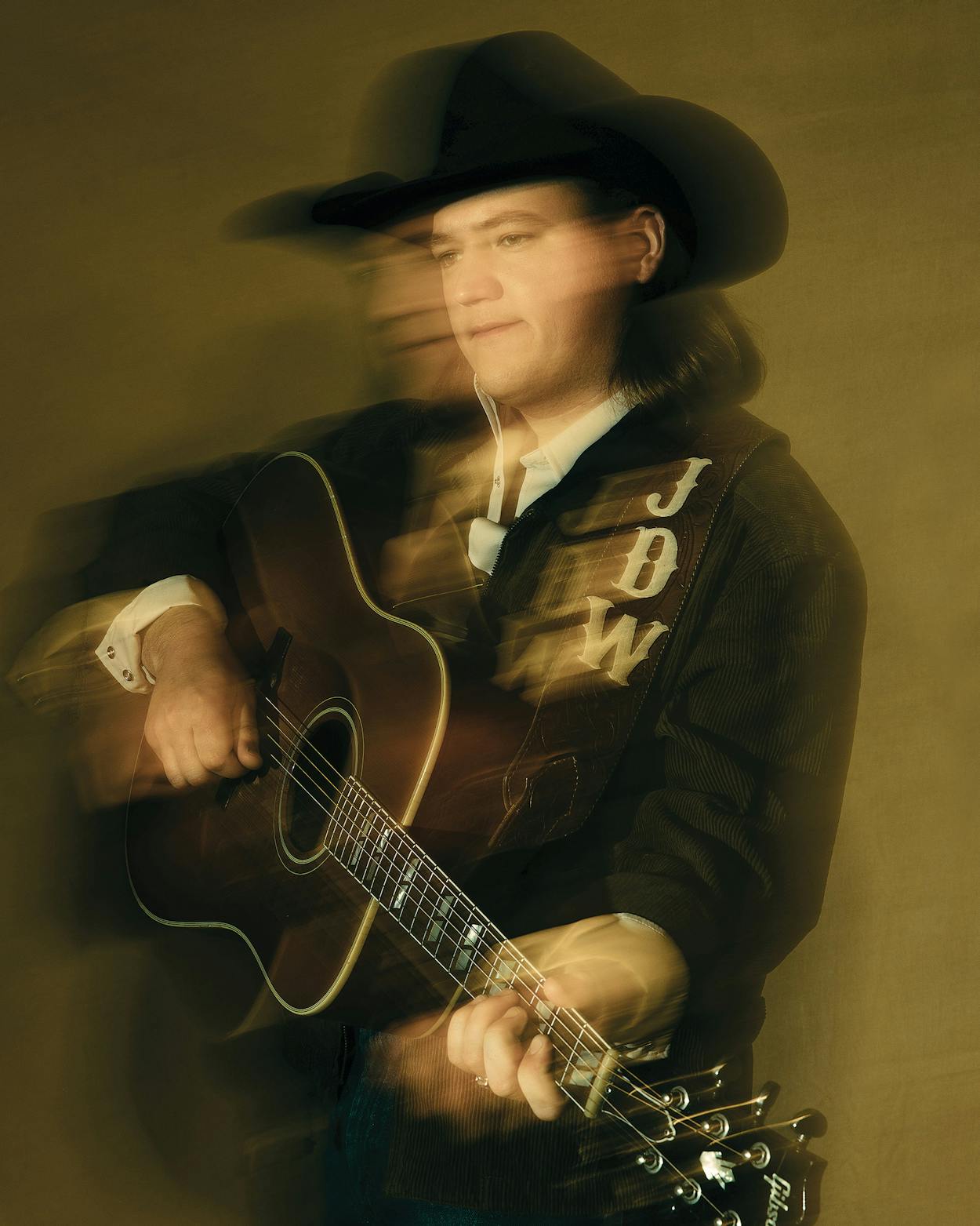When Jake Worthington played the Old Coupland Inn and Dancehall this February, he sounded like he’d stepped in from the past. He sang about drinking whiskey and going to jail, and his voice seemed made for the 119-year-old honky-tonk, located thirty miles northeast of Austin. Sliding from a baritone to a high drawl, the 27-year-old from La Porte, just southeast of Houston, gave off the air of a country star from the nineties, or the seventies, or even before. While he tilted his hat and moved through the smoke and neon, the signed picture of Ray Price on the wall smiled in recognition.
Compared to Worthington, who has played rooms like Coupland since he was fourteen, the music video production around him looked out of place. Instead of two-steppers and five-and-dimers, the room was full of camera operators and assistants glued to email or Slack. The neon light came from an LED sheet, and the smoke came from a Chauvet DJ Hurricane fog machine. The team had flown in for Worthington’s first-ever video shoot as an artist for Big Loud Records, the label that made stars of pop country acts such as Florida Georgia Line. When Big Loud first contacted Worthington, he’d asked himself, “Why is the company that ruined country music calling me to make country music?” On April 7, though, the label released his debut album of gorgeous beer-joint purism. Big Loud executives believe that Music Row trends, which Worthington has spent a decade pushing against, are changing, and they’re betting that his generational vocal talent can help traditional country thrive in Nashville again.
Worthington’s first advice about singing country music came from his grandfather Terry Worthington, whom he called Paw Paw Guitar. Each Christmas the old man would walk into Worthington’s home holding his namesake instrument, and while Worthington’s parents, who worked in child care and construction, stayed in the kitchen, Worthington crossed his legs and listened to his grandfather play Merle Haggard and Faron Young songs. When Worthington sang along, he nailed the melodies, but he felt like he couldn’t get his voice to sound like his idols. “Boy, sing like you’ve got a jalapeño stuck in your ass,” Paw Paw Guitar told him. “You’ll get it.”
Worthington studied videos of old Haggard and George Jones Austin City Limits appearances, and soon he got it. At twelve he started performing at southeast Texas VFW halls, and by the time he was fourteen, Paw Paw Guitar was driving him to central Texas honky-tonks. The old man had tried to make it as a country music act in the seventies—“the perspective I grew up seeing was the failed attempt,” Worthington says—and he often told his grandson, “You good, boy, but you ain’t no Ray Price.” Before long Worthington was used to drunk adults shouting “play something fast!” when he started a ballad. When he finished, some of those same adults would come up to tell him he had the kind of voice that was keeping “real country music” alive.
In 2014, when Worthington was seventeen, the TV singing competition The Voice hosted open tryouts at Reliant Stadium (now NRG Park) in Houston. His mom convinced him to drive in from La Porte, and after his audition, the producers flew him to Los Angeles, where he made it through the next few elimination rounds. On his first episode, he wore starched jeans and a church-friendly haircut and sang “Don’t Close Your Eyes,” a slow crier by his hero Keith Whitley. First Adam Levine pressed the “I Want You” button, then Blake Shelton, then Shakira. Worthington went with Team Blake and made it to the final episode, where he finished as runner-up.
Nine years later, Worthington feels torn when he talks about The Voice. He made good friends and had three singles reach the Top 10 on iTunes, but he didn’t always enjoy L.A.’s music industrial complex. He struggled with the 6 a.m. warm-ups and the hair and makeup sessions, and after the show wrapped, his contract obligated him to join The Voice’s national one time only tour. He says he traveled with Justin Bieber’s former security guards and Mariah Carey’s stage manager, and he harmonized with a dozen other contestants on pop songs such as Imagine Dragons’ “Radioactive.” “I was deathly afraid of playing Houston,” he said. “I didn’t want nobody to see that s—.”
After the tour, eager would-be managers called him at home in La Porte, promising to make him a Nashville star in the model of bro country acts of the time such as Luke Bryan. On these calls, Worthington always emphasized that he wanted to make traditional country music. The more he talked that way, the less the phone rang. He eventually paid $5,000 for a radio promoter and $2,500 for a 1999 Ford Econoline church van, and he announced his own How Do You Honky Tonk? tour. During one leg, he drove from La Porte to the Ranch Saloon in Anaheim, California, continued straight to an unpaid Nashville showcase, drank a few beers, and then had to leave for Maine.
By 2015, though, Worthington’s $7,500 gig offers shrank to $2,500 or less. Few of his tens of thousands of Facebook followers, who were mostly Voice fans, turned out for shows, and many who did were upset to hear him play two-step music. Living in his childhood bedroom, he returned to the honky-tonks that Paw Paw Guitar had driven him to years earlier. These venues welcomed him back, and Worthington perfected an interstate driving loop that began in La Porte, passed through beer joints in Texas towns such as Kenney and Nacogdoches, continued up to Oklahoma for writing sessions with his mentor, Roger Springer, and ended in Nashville for open mics. During these trips, he slept on friends’ trailer home sofas or on a foam mat in the back of the church van. He grew out his hair and posted acoustic covers of songs by singers like Whitley and George Strait, so that people at his shows knew what kind of music to expect.
In early December 2019, Worthington drove nine and a half hours to perform as one of two openers in a Tonkin’ Round the Christmas Tree show in Amarillo. He’d just fired his manager and lost a booking deal, and he felt “pretty damn ready to quit.” But while he sat in the Candlewood Suites hotel near Hoot’s Pub, Worthington got a call from a 615 number. The voice on the line was Seth England, CEO of Big Loud Records in Nashville. England asked if he had heard of Big Loud, and Worthington responded, “Do I starch my jeans?”

Earlier that year, the Big Loud singer-songwriter ERNEST had been scrolling Twitter on a plane when he saw a video of Worthington singing a Whitley cover. “Some people talk about singing from the gut or singing from the throat,” ERNEST said. “That man sings from the past.” When the plane landed, he sent the video to his producer, Joey Moi, Big Loud’s president of A&R.
A Canadian expat who produced four Nickelback albums, Moi had arrived in Tennessee in 2011 as an unlikely candidate to remake country music. Regardless, he’d blended hard rock guitars and hip-hop snare drums into the Nashville sound, and he’d helped turn acts such as Jake Owen, Morgan Wallen, and Florida Georgia Line into major stars. The first time he heard Worthington sing, Moi noted a rare blend of deep tone and technical precision, and he loved that Worthington sounded like a “sixty-five-year-old man trapped in a twentysomething’s body.” Over the next six months, Moi said, he and ERNEST “probably shared twenty videos back and forth, just geeking on this kid.” He eventually showed the videos to England, his partner at Big Loud.
Although Worthington didn’t sound like other Big Loud artists, England was interested in releasing more traditional country music. Looking at streaming metrics, England believed the country industry was shifting from an inverted pyramid model—in which a few big artists create most of the revenue—to a niche model in which subgenres like red dirt, Americana, and neo-traditionalism sit profitably alongside bigger names. To England, the same old-school “authenticity” that had once been Worthington’s liability in Nashville was now an asset. Although his vocal talent could carry almost any Nashville hit, Worthington could also please the hardest-to-impress purists. “On the right record, I think that’s a global country music voice,” England said. “But he certainly has some Texas honky-tonk records that aren’t necessarily a global sound. That’s also his appeal.”
When England called him in Amarillo, Worthington worried that Big Loud wanted him to record something with drum machines. By the end of the call, though, England had started to calm Worthington’s fears. “He told me, ‘We don’t wanna pussyfoot around country music,’ ” Worthington recalls. “In my mind, there ain’t nothing else that needs to be said.”
Worthington signed with Big Loud in October 2021. He turned in around one hundred songs that he’d written or cowritten, and he started talking with Moi. Some nights he’d drink beer and send Moi 2 a.m. messages with ideas inspired by Merle Haggard’s Serving 190 Proof. Other nights they’d talk about the musicians they wanted in the studio for his first album. They ended up booking veterans such as pedal steel player Paul Franklin and guitarist Brent Mason, who represented a lineage that connected Ray Price to George Strait. When I asked Moi how these musicians responded to hearing Worthington sing, he told me they said, “Yes! Finally! Somebody’s bringing it back!”
During his decade playing small Texas towns, Worthington had believed that country music would eventually loop back to its roots. Nashville often moves in a cycle of genre innovation and return to tradition: after the orchestral sixties came the outlaw seventies, and after the soft rock Urban Cowboy era came the neo-traditionalist boom. During those pop-leaning years, venues such as Gruene Hall or the Coupland Inn helped keep the older sound alive, and then they helped launch Willie and Strait. A product of both The Voice and the Texas honky-tonk farm system, Worthington now hopes he can help Nashville get back to making classic-sounding country at scale. “I can’t wait to hear people bitch about hearing a fiddle,” he said. “I can’t wait to hear so much country music it makes me sick.”

On a recent Saturday night in February, Worthington drove with his wife, Sophie, and his dogs, Oscar and Blue, for a concert at the Kenney Store outside Brenham. Walking over the 130-year-old floors and under the upside-down cowboy hats nailed to the ceiling, he and his band took the stage to polite applause. His album, Jake Worthington, wouldn’t come out until early April, and the Store was one of the small venues he’d played many times over the past decade. Some of the crowd, including Worthington’s parents and brother, were there to see him, but others were there to eat dinner and drink beer. They got up to two-step when the band played something fast, but when Worthington started a ballad, the room kept drinking and talking.
Over that noise, Worthington played the first chords to “The State You Left Me In,” which, like nearly every song on the album, he cowrote. It has the kind of lyrics that have echoed through similar rooms for eighty years, about a woman who left town and a man who got left behind. When Worthington sang it, though, the bar crowd looked up like they were hearing something new. His voice moved like a heavyweight boxer dancing on his tiptoes, and it spun elegantly before it hit us in our throats. A waitress dried her eyes, and by the time Worthington sang “I hope you’re doing great / I’m still in the state you left me in,” the chatter had stopped.
Paw Paw Guitar wasn’t there that night, and he died one month later. Almost as a surrogate, when Jake finished singing “The State You Left Me In,” a different old man shouted, “That’s real country music right there! That’s what you call making them cry.”
Max Marshall is a writer living in Austin. His first book, Among the Bros, an investigation into Southern fraternity drug trafficking, is set to be released by HarperCollins in November.
This article originally appeared in the May 2023 issue of Texas Monthly with the headline “No Drum Machines Allowed.” Subscribe today.
- More About:
- Music
- Country Music
- La Porte







